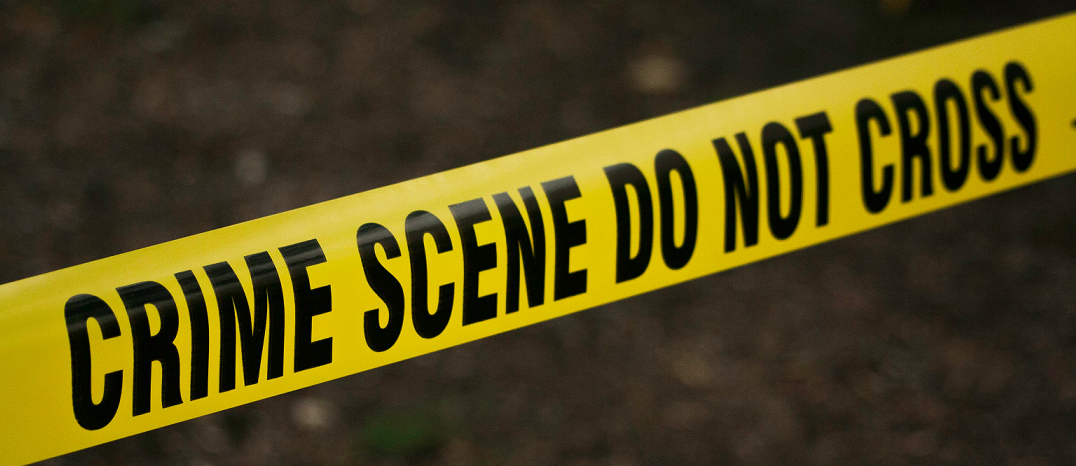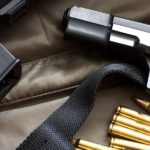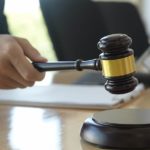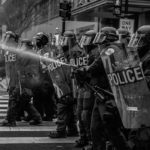No one is above the law, including prosecutors.
A strong, fearless defense lawyer is a defendant’s only hope when a prosecutor seeks to introduce inadmissible evidence, such as a 911 call, and a judge is bending over backward to help the government prove its case.

911 Call Ruled Inadmissible
In U.S. v Nelson, an opinion released August 7, 2013, by the 6th Circuit Court of Appeals, it was determined police testimony that, in response to an anonymous 911 call, Mr. Nelson had a gun was inadmissible hearsay and should not have been allowed at the trial of Mr. Nelson. In other words, the 911 call was ruled inadmissible.
Police were dispatched in response to an anonymous 911 call reporting that a black man wearing a blue shirt with an afro, riding a bicycle, was armed with a pistol. Officers arrived, saw a person matching the description (Mr. Nelson), and ordered him to stop. He did not. As officers in their squad car followed Mr. Nelson on his bike, they saw Mr. Nelson reach into his waistband and throw a large, heavy object into nearby bushes. The officers apprehended and searched Nelson, finding bullets in his pocket and recovering a loaded gun in the bushes. Nelson was charged with being a felon in possession of a firearm and ammunition.
The only issue in the case was, “Did Mr. Nelson have possession of a gun?” Mr. Nelson argued that the 911 caller’s description of the suspect was inadmissible hearsay. The lower court disagreed. The Court of Appeals found that there was enough evidence to support Nelson’s conviction but reversed it anyway. It found that the admission of hearsay evidence to prove Nelson had a gun was inadmissible hearsay and not harmless error because it was more probable than not that it had a material impact on the jury’s verdict.
The Government’s argument Failed, and the 911 call was ruled inadmissible.
The government argued that the testimony regarding the 911 call was just background information and how the officers came to be at Mr. Nelson’s location. Background information might not be hearsay because it is offered not for the truth of the matter asserted, but rather to show why officers acted as they did. Background information was irrelevant in Mr. Nelson’s case because the officer’s background and state of mind were never an issue. A less detailed statement indicating the police received a 911 call without detailing the caller’s description would have avoided the prejudice problem while ensuring that the jury was given the minimal background needed to understand why the officers behaved as they did.
The trial court did instruct the jury regarding the problem. However, the Court of Appeals determined that it was not enough to mitigate the prejudice. Hearsay testimony about the crux of the issue being tried is not admissible.

What is hearsay? Why is hearsay often ruled inadmissible?
Legal hearsay refers to an out-of-court statement made by someone other than the person testifying at trial, which is offered into evidence to prove the truth of the matter asserted in the statement. Essentially, it’s using someone’s words to prove something in court when they aren’t there to testify. Hearsay is generally considered unreliable, including a 911 call, and is therefore usually inadmissible in court, but there are numerous exceptions and exemptions in various legal systems.
Examples of inadmissible hearsay might include:
- A Casual Statement to a Friend: If a friend tells you that they saw someone commit a crime, and you try to testify to that in court, it would generally be inadmissible because the original statement was not made under oath, and the accused has no opportunity to cross-examine the friend.
- Business Records not meeting the requirements: Sometimes, business records can be admitted under a business records exception, but if the proper foundation is not laid, such as proving the record was made at or near the time by — or from information transmitted by — someone with knowledge, they could be considered hearsay and be inadmissible.
- Police Report: If a police officer writes in a report that a witness stated the accused ran a red light, that statement may be considered hearsay if it’s offered to prove that the accused actually ran the red light without the witness being present for cross-examination.
- Written Affidavit without Testimony: If someone swears in a written affidavit that they saw something relevant to the case but is not available or unwilling to testify in court, that affidavit is usually inadmissible as hearsay.
When might a 911 call be rued admissible in court?
In Michigan, as in many other jurisdictions, several exceptions to the hearsay rule might allow for the admission of a 911 call recording. Here are some that might apply:
- Excited Utterance: If the 911 call was made immediately after a startling event and the caller was still under the stress or excitement caused by the event, the recording might be admissible as an excited utterance.
- Present Sense Impression: If the 911 call describes or explains an event or condition made while the caller perceived the event or immediately thereafter, it could be admitted under this exception.
- Recorded Recollection: If a witness doesn’t remember the details of the event they reported in the 911 call, the recording of the call might be admissible as a past recollection recorded, provided certain criteria are met.
- Public Records and Reports: Under certain circumstances, 911 calls may be considered public records and, therefore admissible if they meet the criteria for this exception.
- Statement for Medical Diagnosis or Treatment: If the 911 call includes statements made to obtain medical diagnosis or treatment, those statements might be admissible under this exception.
- Forfeiture by Wrongdoing: If it’s proven that the defendant engaged in wrongdoing that was intended to, and did, procure the unavailability of the declarant as a witness (such as intimidation or murder), the statements could be admissible under this doctrine.
- Impeachment: If someone testifying in court says something different than what they told a 911 dispatcher, the defense or prosecution might use the recording to impeach their credibility.
- Refresh Recollection: Although not admissible as evidence, a 911 recording could be used to help refresh the recollection of someone having trouble remembering something related to their call to 911 dispatch.
- Evidence of a Crime: Suppose someone calls 911 to falsely report a crime or make a terrorist threat. In that case, the words said during the call constitute criminal activity and would be admissible as evidence.
The application of these exceptions can be complex and highly dependent on the facts of a particular case, and the laws and rules might change. A lawyer who is well-versed in Michigan evidence law, such as the attorneys with LEWIS & DICKSTEIN, P.L.L.C., would be the best source to analyze the specific situation and determine the likelihood that a 911 call recording would be admissible in a particular case.

Michigan Criminal Defense Attorneys With Expertise in Evidence
If you are ever in a position where you are facing criminal charges, it is essential that you have the best legal representation available. The attorneys at LEWIS & DICKSTEIN, P.L.L.C. have decades of experience practicing exclusively criminal law. We are regularly in state and federal courts and have good working relationships with prosecutors and courts. If you face felony or misdemeanor allegations, we can help you. Call us for a free consultation. Our attorneys have filed and won motions seeking rulings that evidence, such as 911 calls, is inadmissible.
Call us today at (248) 263-6800 for a free consultation or complete an online Request for Assistance Form. We will contact you promptly and find a way to help you.











